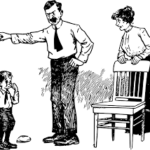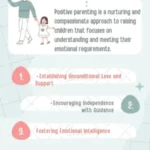In the intricate journey of parenting, the concept of discipline often carries the weight of misconception. Rooted in the Latin word “disciplina,” meaning teaching and learning, discipline takes on a profound role in shaping the behavior of our children. As parents, our primary objective is not to shame or control but to teach – an ever-evolving process as we navigate the realms of parenthood ourselves.
The Essence of Positive Discipline
Empowering, Not Controlling
Discipline, in the context of parenting, is a tool for empowerment, not coercion. The objective is to instill self-regulation skills within our children, fostering an environment where they learn to modify their behavior organically rather than conforming to rigid rules dictated by fear.
Natural Outgrowth of Childhood Behaviors
Children undergo a natural progression of behavioral changes as their brains mature. Understanding this developmental aspect is crucial for parents. Mistakes become learning opportunities, and our role is to guide children in developing a healthy relationship with their emotions, emphasizing that errors are stepping stones, not sources of shame.
Cultivating a Growth Mindset in Toddlers
Shifting Perspectives: Fixed Mindset vs. Growth Mindset
Toddlers, existing in the present, often operate with a “fixed” mindset, where change seems implausible. It becomes imperative for parents to teach them the concept of growth – that behavior can evolve, and they can grow beyond their current actions.
5 Steps for Positive Discipline
1. Acknowledge Feelings While Setting Boundaries
When your child exhibits behavior that requires redirection, start by acknowledging their feelings. For instance, “It is okay to have big feelings, but we won’t use our hands to express them.” Establishing boundaries with empathy is the first step towards positive discipline.
2. Allow Expression of Emotion
Children may react emotionally when faced with obstacles. Acknowledge these emotions and reinforce the acceptance of their feelings. “It is okay to feel frustration; I am here to keep you and your friend safe.”
3. Comfort and Soothe
In the midst of heightened emotions, the goal is to calm the child’s nervous system. Assure them that emotions are not threats and provide comfort until they regain composure.
4. Once Calm, Problem Solve
After emotions have settled, engage in problem-solving. Collaborate with your child to find alternatives, encouraging their involvement in finding solutions.
5. Empower, Don’t Shame
As children calm down, feelings of shame may arise. Counteract this by emphasizing empowerment. Remind them that mistakes are part of learning, and they will remember for next time. Use phrases like, “You’ll remember next time.”
The Positive Impact: Shifting Focus to Growth
Following these steps transforms discipline into a positive force, empowering children to modify their behavior without the burden of shame. By acknowledging emotions, fostering problem-solving, and instilling the belief that change is possible, positive discipline embraces a growth mindset.
Celebrating Successes, Learning from Mistakes
This approach not only helps children overcome immediate challenges but also provides a foundation for the future. When children do remember and exhibit improved behavior, the sense of pride and accomplishment is palpable. The focus shifts from mistakes to achievements, fostering a mindset of continuous growth.
Nurturing a Growth Mindset: The Key to Lasting Change
In essence, positive discipline works by cultivating a growth mindset in children. It enables them to see challenges as opportunities for growth and learn from every experience. The blend of learning opportunities, brain maturity, and the emphasis on empowerment collectively contribute to a positive and effective parenting approach.
Conclusion
Embracing positive discipline is not just a parenting strategy; it’s a mindset shift. By imparting the principles of teaching over control, acknowledging emotions, and nurturing a growth mindset, parents lay the groundwork for resilient, adaptable, and emotionally intelligent individuals. As we navigate the intricate path of parenthood, positive discipline emerges as a beacon guiding both parents and children toward a future of continuous growth and mutual understanding.





